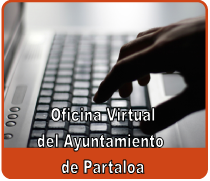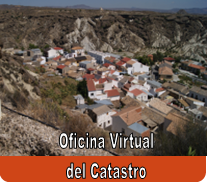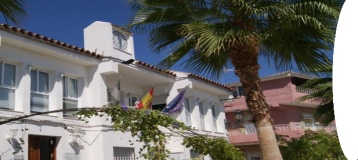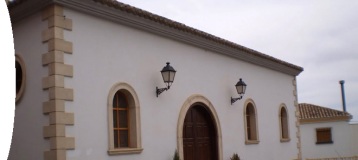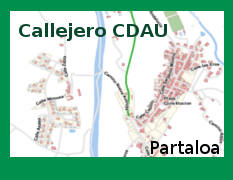Fiesta de carácter popular de tres días de duración en torno al 15 de Agosto. Desde hace mucho tiempo y respondiendo a la imagen de Partaloa emigrante el pueblo cuando mas afluencia de personas tenía era en verano, así que se decidió que la fiesta patronal de San Antonio de Padua que se celebra el 13 de Junio debería tener alguna referencia en la época estival que era cuando mas gente había. Se caracteriza por la infinidad de actividades que se organizan.
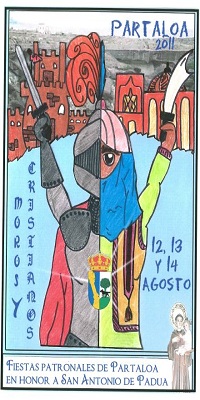
La feria del medio día se ha hecho fuerte en este festejo ,donde las tapas junto con la cerveza o diferentes tipos de vinos abren cada uno de los días de fiesta.
Las noches son amenizadas con las diferentes orquestas que actúan en la Plaza de la Constitución siendo el partalobense propenso al baile típico español ( pasodobles, rumbas...) Por las tardes los pasacalles ,castillos hinchables o el toro mecánico hacen el deleite de los mas pequeños. Y como no, ya de forma típica, se ha instalado la fiesta de la espuma donde grandes y pequeños se divierten de forma conjunta.
Los Moros y Cristianos en el pueblo de Partaloa se han convertido en algo tan típico como el periodo de fiesta en el que se celebran aunque no tengan representación todos los años. Hay un gran despliegue de caballos y disfraces emulando la conquista mora de Partaloa y su posterior expulsión Cristiana. Todo el pueblo se reúne en la rambla en torno al sábado y domingo de la fiesta de Agosto. Los participantes por el bando moro son Rey Moro , embajador moro, espía moro y tropa. Por el lado cristiano cuentan igualmente con Rey Cristiano, embajador cristiano, espía cristiano y tropa. El sábado se representa el desembarco moro y la conquista de Partaloa. Solicitando el embajador de este bando a su rey el poder dirigir el pueblo que tanto tiempo ha estado sin gobierno. El Domingo por el contrario se representa la reconquista por parte cristiana, emulando la entrada de Partaloa en el 1500 a los Reyes Católicos . Esta representación aumenta en interés para los asistentes cuando los participantes aluden a los ciudadanos en tono de sorna, y en intervenciones en poesía no se deja títere con cabeza respecto a lo acontecido en el último año en el pueblo. Nadie se toma a mal dichas criticas, apelando al entorno festivo en el que se representan.


<p><h1>Patron Saint Festivity. </h1></p>
the popular feast go on three days around 15 August. It has a very long tradition, and it is celebrated in summer due to the fact that Partaloa is a town of emigrants, so long time ago, our people thought that this festivity (in honor of our patron Saint Anthony of Padua 13th June) had to be moved to the date when more people came back to their homes in Partaloa, that is, August, and actually this festival is the one with more activities in our town.
One of these activities that is growing up in participation in the last years is Feria del mediodía, where our people enjoy the typical tapas served with beer or wine.
Once the night has come, the music of the bands in the ball invades La Plaza de la Constitución, especially with traditional Spanish music, like Pasodoble or rumba, which are the favorite rhythms of our citizens. The afternoons are dedicated to our children, who enjoy with beautiful parades and fairgrounds amusements. And, of course, the foam party is already one of our more famous amusements that make the delights of young and old people together.
Our traditional festival of Moros y Cristianos is for Partaloa very special although It has not performance every year. It consists on a performance of the battles (that took place in Partaloa) between moors and Christians. Beautifully dressed up, and riding amazing horses, our people can enjoy by recreating of our history at the same time that the audience enjoy with the performance. All the Town of Partaloa meets in La Rambla on Saturday and Sunday in the feast period. In the Moors side are the king Moor, the Ambassador, the Spy, and the troops. In the Christian side we can find the Christian King, the Ambassador, their spy and the troops. Saturday afternoon, the Moor landing and the conquest of Partaloa are performed. The Ambassador of the Moors requests to his king the control of that people that has been ungoverned too much time. Sunday performance, by the contrary, is about the re-conquest of Christian people of Partaloa lands, emulating when The Catholic Monarchs restored his power over Partaloa, around 1500.
This performance is growing up every year, because the actors mention people of our town in a joking tone, and no one is safe of their pranks, although this is not offensive at all for the aforesaid ones, by the contrary, this is part of the fun.
